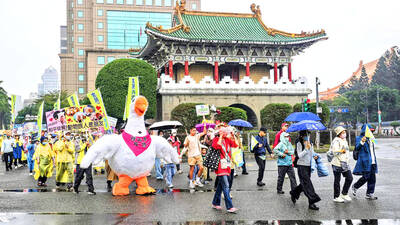Immigrants married to Taiwanese nationals are mostly happy with life in Taiwan, even though their average household income is less than half the national average, to a census released yesterday by the Ministry of the Interior showed.
A total of 498,368 foreign-born spouses, including naturalized immigrants and foreign nationals, call Taiwan home. At 67.6 percent, more than two-thirds come from China, Hong Kong or Macau; another 28.1 percent are from Southeast Asia, predominantly Vietnam, Indonesia, Thailand, the Philippines and Cambodia, according to ministry statistics.
In the once-in-five years census of foreign-born spouses, 92.9 percent of respondents described life in their adoptive country as “happy” (幸福), and 87 percent said they do not have trouble communicating with their Taiwanese family members despite cultural and linguistic barriers.
The survey found that the average monthly household income in families with new immigrants was NT$46,173, less than half the national average of NT$98,073.
Among the offspring of immigrants, the ministry found that 40.3 percent of children interviewed for the census cannot speak their foreign-born parents’ native language, despite a government push to promote “mother language” learning.
The statistics also showed that the largest single group of immigrants by marriage is women from China, Hong Kong or Macau, at 315,293 people or 63.3 percent. The next biggest group is women from Vietnam, at 90,503.
For men, the largest single group also came from China, Hong Kong or Macau at 21,735, with men from Thailand taking a distant second place at 2,661.
The survey part of the census was conducted during visits to immigrants between September and December 2013, yielding 13,688 valid samples. Further samples were collected during eight forums for foreign-born spouses and two expert forums in the middle of last year.

NUMBERS IMBALANCE: More than 4 million Taiwanese have visited China this year, while only about half a million Chinese have visited here Beijing has yet to respond to Taiwan’s requests for negotiation over matters related to the recovery of cross-strait tourism, the Tourism Administration said yesterday. Taiwan’s tourism authority issued the statement after Chinese-language daily the China Times reported yesterday that the government’s policy of banning group tours to China does not stop Taiwanese from visiting the country. As of October, more than 4.2 million had traveled to China this year, exceeding last year. Beijing estimated the number of Taiwanese tourists in China could reach 4.5 million this year. By contrast, only 500,000 Chinese tourists are expected in Taiwan, the report said. The report

Temperatures are forecast to drop steadily as a continental cold air mass moves across Taiwan, with some areas also likely to see heavy rainfall, the Central Weather Administration (CWA) said. From today through early tomorrow, a cold air mass would keep temperatures low across central and northern Taiwan, and the eastern half of Taiwan proper, with isolated brief showers forecast along Keelung’s north coast, Taipei and New Taipei City’s mountainous areas and eastern Taiwan, it said. Lows of 11°C to 15°C are forecast in central and northern Taiwan, Yilan County, and the outlying Kinmen and Lienchiang (Matsu) counties, and 14°C to 17°C

STEERING FAILURE: The first boat of its class is experiencing teething issues as it readies for acceptance by the navy, according to a recent story about rudder failure The Hai Kun (海鯤), the nation’s first locally built submarine, allegedly suffered a total failure of stern hydraulic systems during the second round of sea acceptance trials on June 26, and sailors were forced to manually operate the X-rudder to turn the submarine and return to port, news Web site Mirror Daily reported yesterday. The report said that tugboats following the Hai Kun assisted the submarine in avoiding collisions with other ships due to the X-rudder malfunctioning. At the time of the report, the submarine had completed its trials and was scheduled to begin diving and surfacing tests in shallow areas. The X-rudder,

DEMAND: The government should enact regulations in line with Austria and Germany to incorporate vegan nutrition into school meals, an advocate said More than 1,000 people yesterday marched in Taipei to promote veganism, calling for legislation to incorporate vegan diets into school lunches and the national net zero emissions program. Participants gathered on Ketagalan Boulevard in front of the Presidential Office Building for the march, which was organized by the Vegan Action Network (VAN). Former ambassador to Chad Chiu Chung-jen (邱仲仁), actor Yankee Yang (楊子儀) and actress Cindy Lien (連俞涵) attended the event. VAN member Marianne Chao (趙梅君) said that the campaign aimed to urge the government to promote vegan diets across schools and government agencies via legislation and national policies, which would help build